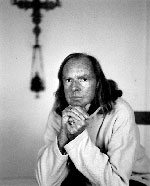
Welcome to Hyperion Records, an independent British classical label devoted to presenting high-quality recordings of music of all styles and from all periods from the twelfth century to the twenty-first.
Hyperion offers both CDs, and downloads in a number of formats. The site is also available in several languages.
Please use the dropdown buttons to set your preferred options, or use the checkbox to accept the defaults.

Although composing had already become his overriding passion, Tavener’s family was still expecting him to embark on a career as a concert pianist and to this end he was sent to play to Solomon, the legendary, but by then, paralysed pianist whose house had just been renovated by C. Tavener & Son. It was however, another of his grandfather’s clients who was to have the more lasting effect. She was Rhonda, Lady Birley, and it was at her home, Charleston Manor, that John was encouraged to flex his musical muscles and put on performances of his latest works. By the late 1960s the family firm had added The Beatles to its list of clients and was engaged in refurbishing their various houses and the offices of their Apple Corporation. The two Johns—Tavener and Lennon—met one evening in Kensington and, over dinner, played tapes of each other’s most recent music. So impressed was Lennon by what he heard that it was soon decided to record, on Apple Records, Tavener’s latest composition, The Whale, a work dedicated to Lady Birley but written for the London Sinfonietta’s inaugural concert.
The Whale certainly put Tavener and his music on the map and commissions started to come in from all sides. Most of these new works grew out of Tavener’s strong religious convictions which, at that time, were gradually, but inexorably, moving away from the teachings of the Western Church toward those of the East; he was finally received into the Orthodox Church in September 1977. As time went on, Tavener began more and more to incorporate into his own music the sacred tone systems used for the orthodox liturgy. The pieces he was then writing were predominantly vocal, but, in 1987, came The Protecting Veil for cello and string orchestra. Inspired by the Feast of the Protecting Veil of the Mother of God, the popularity this piece enjoyed did again for Tavener what The Whale had done for him some twenty years before; put him firmly in the public eye and made his music immensely popular.
He had been encouraged to write music for ‘the market place’, not just for the church, by Mother Thekla, Abbess of the Orthodox Monastery at Normanby in Yorkshire, who by then had become his spiritual adviser, friend and librettist. One of the many rich fruits of the collaboration between Mother Thekla and Tavener has been the opera Mary of Egypt which, after a very long gestation period, was first performed in June 1992. The part of Mary on that occasion was taken by Patricia Rozario and it has been with this splendid singer in mind that Tavener wrote several more of his works.
from notes by Peter Avis © 1998




